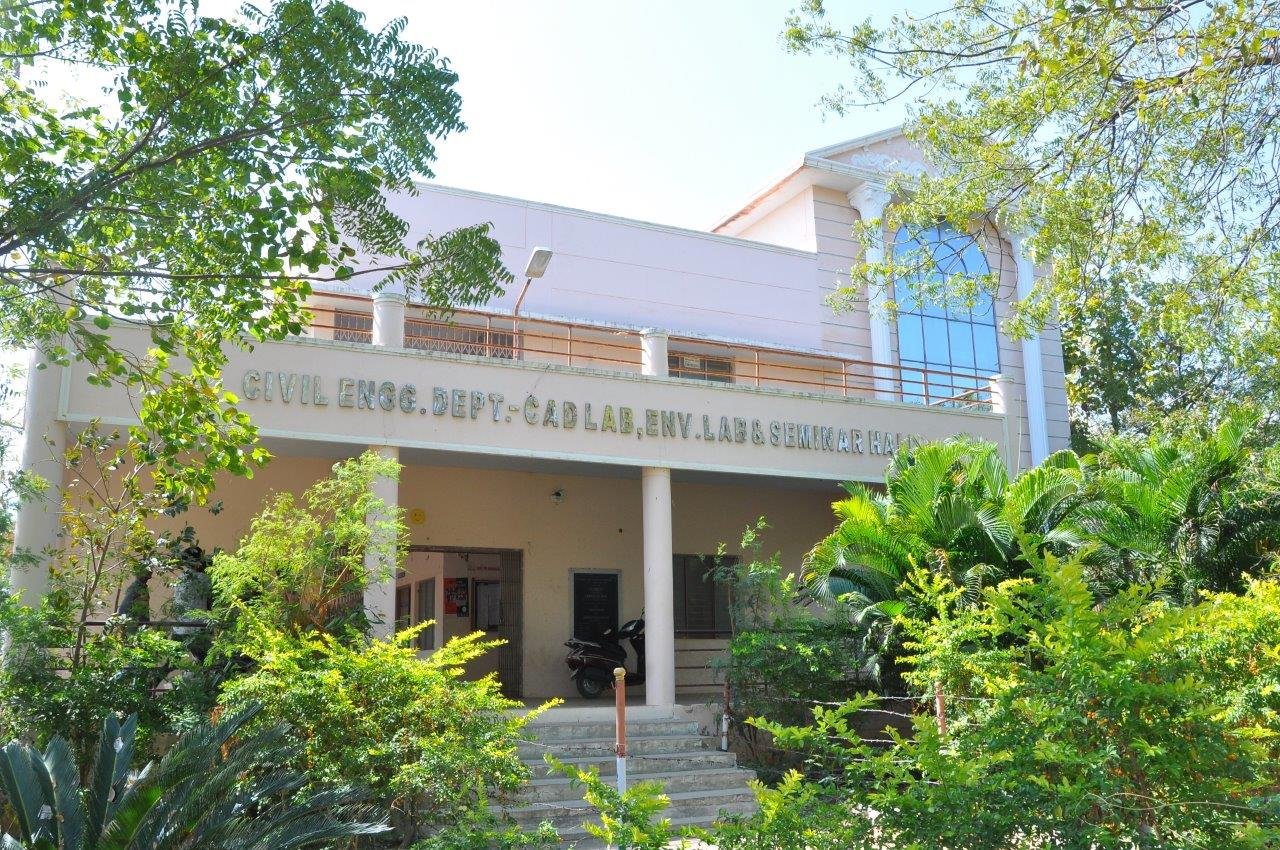
|
About Department
|
|
The department of Civil Engineering was established in 1946 offering B. Tech. course with an intake of 30 students, which was enhanced to 60 in the year 2010. The M. Tech. Structural Engineering course was started in the year 1971 with an intake of 10 students, which was enhanced to 25 in the year 2001, M. Tech. Computer Aided Structural Engineering was started in the year 2001 with an intake of 25 students. The research facilities in the department are sufficient for doing MS and PhD programs
The students are provided good computing and internet facilities. The department has well equipped laboratories, including Automatic compression Testing Machine, 3000 KN capacity with stress & strain controlled, Analogue Hydrostatic Pressure testing equipment and High arm Electrically operated digital compression testing machine of 3000 KN to test 3m columns. Certain sophisticated equipment like Profometer 5 (Model “S”), Universal Triaxial outfit and Core case (core cutter) have been purchased for carrying out research work by students and faculty. The priority research areas for research are Artificial Neural Networks, Fuzzy Systems and Genetic Algorithms, Their Applications in Civil Engg, Finite Element Analysis of structures, Micro & Macro analysis of Composites, Fiber Reinforced Concretes, Slurry Infiltrated Fibrous Concrete (SIFCON),Glass Fiber reinforced Concretes, High-performance-concrete, Low Cost Housing Materials and Techniques, Repair and Rehabilitation of structures, Light weight aggregates, Ferro cement ,Fracture Mechanics, Ground Improvement techniques, Heat transfer through soils, Soil cement blocks, Watershed Management. The teachers also participate in academic and personal counseling of students. The department aids in student placements by organizing group discussions, mock interviews, essay writing, debates, aptitude tests, technical quizzes, etc. The alumni of the department are occupying distinguished positions in reputed organizations and often contribute in the development activities of the department.
|
| |
Programme Educational Objectives (PEOs):
 |
PEO 1.
To provide the students a solid foundation in mathematical, scientific and engineering fundamentals required to solve Civil Engineering problems and also to pursue higher studies in any specialization of Civil Engineering. |
|
 |
PEO 2.
To train the students over a wide spectrum of civil engineering subjects so that they can comprehend, analyze, design and create systems and solutions for real life problems. |
|
 |
PEO 3.
To provide the students the skills required for higher learning as well as to succeed in professional career with a base for lifelong learning process and also to imbibe a spirit of professional and ethical attitude , effective communication skills with an ability to relate Engineering issues to the broader social needs. |
Programme Outcomes
 |
PO 1 :
Engineering knowledge: Apply the knowledge of mathematics, science, engineering fundamentals, and an engineering specialization to the solution of complex engineering problems.
|
|
 |
PO 2 :
Problem analysis: Identify, formulate, review research literature, and analyze complex engineering problems reaching substantiated conclusions using first principles of mathematics, natural sciences, and engineering sciences.
|
|
 |
PO 3 :
Design/development of solutions: Design solutions for complex engineering problems and design system components or processes that meet the specified needs with appropriate consideration for the public health and safety, and the cultural, societal, and environmental considerations. |
|
 |
PO 4 :
Conduct investigations of complex problems: Use research-based knowledge and research methods including design of experiments, analysis and interpretation of data, and synthesis of the information to provide valid conclusions. |
 |
PO 5 :
Modern tool usage: Create, select, and apply appropriate techniques, resources, and modern engineering and IT tools including prediction and modeling to complex engineering activities with an understanding of the limitations. |
 |
PO 6 :
The engineer and society: Apply reasoning informed by the contextual knowledge to assess societal, health, safety, legal and cultural issues and the consequent responsibilities relevant to the professional engineering practice. |
 |
PO 7 :
Environment and sustainability: Understand the impact of the professional engineering solutions in societal and environmental contexts, and demonstrate the knowledge of, and need for sustainable development. |
 |
PO 8 :
Ethics: Apply ethical principles and commit to professional ethics and responsibilities and norms of the engineering practice. |
 |
PO 9 :
Individual and team work: Function effectively as an individual, and a as a member or leader in diverse teams, and in multidisciplinary setting. |
 |
PO 10 :
Communication: Communicate effectively on complex engineering activities with the engineering community and with society at large, such as, being able to comprehend and write effective reports and design documentation, make effective presentations, and give and receive clear instructions. |
 |
PO 11 :
Project management and finance: Demonstrate knowledge and understanding of the engineering and management principles and apply these to one’s own work, as a member and leader in a team, to manage projects and in multidisciplinary environments.
|
 |
PO 12 :
Life-long learning: Recognize the need for, and have the preparation and ability to engage in independent and life-long learning in the broadest context of technological change. |
Program Specific Outcomes
 |
PSO 1.
Able to apply the knowledge gained during the course of the program , from Mathematics ,basic computing ,basic sciences & Social sciences in general and all civil courses in particular to identify ,formulate & solve real life problems faced in industries and / or during research work.
|
|
 |
PSO 2.
Able to provide socially acceptable technical solutions to complex civil engineering problems with the applications of modern and appropriate techniques for sustainable development. |
|
|
|